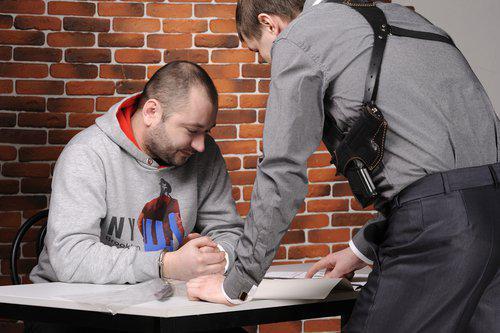Recent Blog Posts
Understanding Miranda Rights: Right to Counsel and Avoiding Inadvertent Waiver
 Through each stage of the criminal justice system you have rights that must be protected. The Fifth and Sixth Amendments to the United States Constitution grant you many rights, including the right to an attorney in most stages of criminal proceedings. These rights ensure that your trial is fair and that you do not unjustly get sent to prison. However, some of your rights, including the right to an attorney, can be waived.
Through each stage of the criminal justice system you have rights that must be protected. The Fifth and Sixth Amendments to the United States Constitution grant you many rights, including the right to an attorney in most stages of criminal proceedings. These rights ensure that your trial is fair and that you do not unjustly get sent to prison. However, some of your rights, including the right to an attorney, can be waived.
Each year numerous people are arrested in the United States and are charged with drug violations. To be sure, the Bureau of Justice Statistics, in 2007, estimated that 14 million individuals were arrested across the United States, and approximately 1,800,000 of those individuals were arrested for drug violations. In Wisconsin, according to the Wisconsin Department of Justice, approximately 340,000 individuals were arrested in 2012, and an estimated 27,000 of those arrests were related to drugs.
Murder Charges and the Alibi Defense
 In many murder or homicide cases, defendants argue the case of mistaken identity—the prosecution charged the wrong person for the wrongful death of another. When you are facing murder charges for a crime that you did not commit, an alibi defense could be the key to dismissing the charges against you. The alibi defense is based on the underlying premise that you are truly innocent of the charges or any wrongdoing.
In many murder or homicide cases, defendants argue the case of mistaken identity—the prosecution charged the wrong person for the wrongful death of another. When you are facing murder charges for a crime that you did not commit, an alibi defense could be the key to dismissing the charges against you. The alibi defense is based on the underlying premise that you are truly innocent of the charges or any wrongdoing.
In traditional murder cases without an alibi defense, your defense attorney would argue that the prosecution failed to prove that you were guilty of the crime, beyond a reasonable doubt. The burden is on the prosecution to prove every element of the crime. However, when you raise the alibi defense, you have to persuade the judge or jury that the prosecution is charging the wrong person. The alibi defense rests on the credibility of your alibi witness.
Mental Illness: Understanding the Insanity Defense to Criminal Charges
 Depending on the facts surrounding your criminal case, there may be several defenses available. One of these defenses is the "insanity defense." When a defendant asserts the insanity defense, the defendant is arguing that he or she was not criminally responsible for his or her actions. The insanity defense is one of the most famous defenses in criminal law, although it is rarely used.
Depending on the facts surrounding your criminal case, there may be several defenses available. One of these defenses is the "insanity defense." When a defendant asserts the insanity defense, the defendant is arguing that he or she was not criminally responsible for his or her actions. The insanity defense is one of the most famous defenses in criminal law, although it is rarely used.
Typically, when a defendant asserts the "insanity defense" he or she will be required to be mentally evaluated. If the defense is successful, the defendant will be committed to a psychiatric facility instead of a correctional facility, depending on the circumstances of the case. This is because the insanity defense is based on the principle that incarceration or punishment is justified only when the defendant is capable of controlling his or her behavior and understanding the consequences of that behavior. Since people with certain mental disorders are incapable of knowing what is right or wrong, the insanity defense will prevent individuals with mental disorders from being punished criminally.
Understanding the Proper Times to Withdraw a Guilty Plea
 Making the decision to plead guilty to a crime is never an easy task for anyone to do. You are forced to stand up in front of a judge and admit the allegations recited by the prosecutor. Commonly, those that plead guilty often regret their decision later on. The lingering question in the mind of people in this situation is, “Can I withdraw my guilty plea?” Depending on the situation, whether or not you have already been sentenced, and reasons for withdrawing, you may be able to.
Making the decision to plead guilty to a crime is never an easy task for anyone to do. You are forced to stand up in front of a judge and admit the allegations recited by the prosecutor. Commonly, those that plead guilty often regret their decision later on. The lingering question in the mind of people in this situation is, “Can I withdraw my guilty plea?” Depending on the situation, whether or not you have already been sentenced, and reasons for withdrawing, you may be able to.
Generally, it is much easier to withdraw your guilty plea prior to sentencing as opposed to attempting to withdraw it after sentencing. Although it is easier, however, it is not simple by any means. Typically, a judge will look to several factors in deciding whether or not he or she will grant your motion to withdraw your guilty plea. These factors include:
Defending against Theft Charges in Wisconsin
 Throughout history, theft has been interchangeably identified as larceny. Under Wisconsin law, a larceny or theft is committed when an individual intentionally “takes and carries away, uses, transfers, conceals, or retains possession of movable property of another without the other's consent and with intent to deprive the owner permanently of possession of such property.”
Throughout history, theft has been interchangeably identified as larceny. Under Wisconsin law, a larceny or theft is committed when an individual intentionally “takes and carries away, uses, transfers, conceals, or retains possession of movable property of another without the other's consent and with intent to deprive the owner permanently of possession of such property.”
If you or someone you loved was wrongly charged with committing a theft, you should contact an experienced theft defense attorney who will evaluate your case and advise you of the best course of action depending on the circumstances of your case.
Elements of Theft
A theft is committed in a variety of ways. The prosecution is required to prove each and every element of theft beyond a reasonable doubt. In order to be convicted of theft, the prosecution has to prove:
Understanding Motions to Suppress in the Context of Traffic Stops
 Individuals all throughout Wisconsin have, at one point in time, found themselves detained by a police officer for a traffic violation. Of course, this may be for good reason, or it may have been conducted illegally. To be sure, when a law enforcement officer pulls you over, they must have a probable cause that a crime has been committed. This means that if you were driving one mile over to speed limit, or had a broken tail light at the time you were pulled over, the officer was within their lawful powers to pull you over.
Individuals all throughout Wisconsin have, at one point in time, found themselves detained by a police officer for a traffic violation. Of course, this may be for good reason, or it may have been conducted illegally. To be sure, when a law enforcement officer pulls you over, they must have a probable cause that a crime has been committed. This means that if you were driving one mile over to speed limit, or had a broken tail light at the time you were pulled over, the officer was within their lawful powers to pull you over.
If the traffic stop was illegal, a motion to suppress would be appropriate. A motion to suppress is a tool used to challenge the admissibility of evidence used in the prosecution’s case against the defendant. When the court is deciding whether to grant or dismiss a motion to suppress, the court will look at the totality of circumstances, which includes the officer’s decision to stop and arrest you.
Fighting OWI Charges in Wisconsin
 Getting charged and convicted with operating while intoxicated (OWI) can have devastating consequences on your life. If you are found guilty, your driver’s license could be revoked, your insurance will increase and you might be looking at significant fines and jail time.
Getting charged and convicted with operating while intoxicated (OWI) can have devastating consequences on your life. If you are found guilty, your driver’s license could be revoked, your insurance will increase and you might be looking at significant fines and jail time.
Wisconsin, like many states, passed laws to combat drunk driving. According to the law, no person is permitted to operate a motor vehicle under the influence of drug or alcohol.
Therefore, in order for you to be found guilty, the prosecution must prove that you were 1) operating an automobile 2) while under the influence of drug or alcohol.
Implied Consent
Wisconsin has adopted a law known as implied consent. This ultimately means that if you are lawfully arrested by a police officer who believes that you were operating an automobile under the influence, you are required to take a blood, urine or breathalyzer exam. This law applies even if you are not operating the automobile. For example, if you pulled the car over to sleep, turned the engine off and took a nap, and the police find you, you will be required to take an exam to determine if there are drugs or alcohol in your system and you may be charged with an OWI.
Not Guilty: Defending against Bank Robbery Charges
 Traditionally, robbery was defined as using force or intimidation to take property from another. Today, when individuals steal from a bank by force or intimidation, they are guilty of bank robbery. The simple conduct of passing a note to a bank teller demanding money falls under the category of bank robbery even if you did not use a weapon, it is intimidation.
Traditionally, robbery was defined as using force or intimidation to take property from another. Today, when individuals steal from a bank by force or intimidation, they are guilty of bank robbery. The simple conduct of passing a note to a bank teller demanding money falls under the category of bank robbery even if you did not use a weapon, it is intimidation.
Under Wisconsin law, bank robbery is a serious offense. According to the law, a person who commits bank robbery is one who: “by use of force or threat to use imminent force takes from an individual or in the presence of an individual money or property that is owned by or under the custody or control of a financial institution.” Bank robbery is a Class C felony and carries a possible $100,000 fine, up to 40 years imprisonment, or in some cases both.
Objective Reasonableness: Mistakes of Law and the Fourth Amendment
 When you are about to be pulled over by law enforcement officers, you presume the officers pulling you over know the law, since they are charged with enforcing it. Usually, law enforcement officers are aware of the laws they are enforcing. Sometimes, however, law enforcement officers stop you based on their mistaken belief of the law — specifically, on an incorrect understanding of the law.
When you are about to be pulled over by law enforcement officers, you presume the officers pulling you over know the law, since they are charged with enforcing it. Usually, law enforcement officers are aware of the laws they are enforcing. Sometimes, however, law enforcement officers stop you based on their mistaken belief of the law — specifically, on an incorrect understanding of the law.
- Judged through the perspective of a reasonable officer;
Attempted Homicide and the Prosecution’s Case
 Homicide charges are some of the most serious crimes punished by society because homicide is often an intentional or unlawful taking of a human life, unless it is justified. In most states, including Wisconsin, the death penalty has been abolished. However, if someone commits homicide while also committing federal crimes, even if they lived and committed those crimes in Wisconsin, they could be subject to the death penalty.
Homicide charges are some of the most serious crimes punished by society because homicide is often an intentional or unlawful taking of a human life, unless it is justified. In most states, including Wisconsin, the death penalty has been abolished. However, if someone commits homicide while also committing federal crimes, even if they lived and committed those crimes in Wisconsin, they could be subject to the death penalty.
Like homicide, attempted homicide is an extremely serious offense that comes with some of the most severe penalties that Wisconsin law has to offer. Attempted homicide occurs only when an individual intends to commit a homicide and tries to carry out the homicide but, for some reason, this individual fails to finish the crime.







